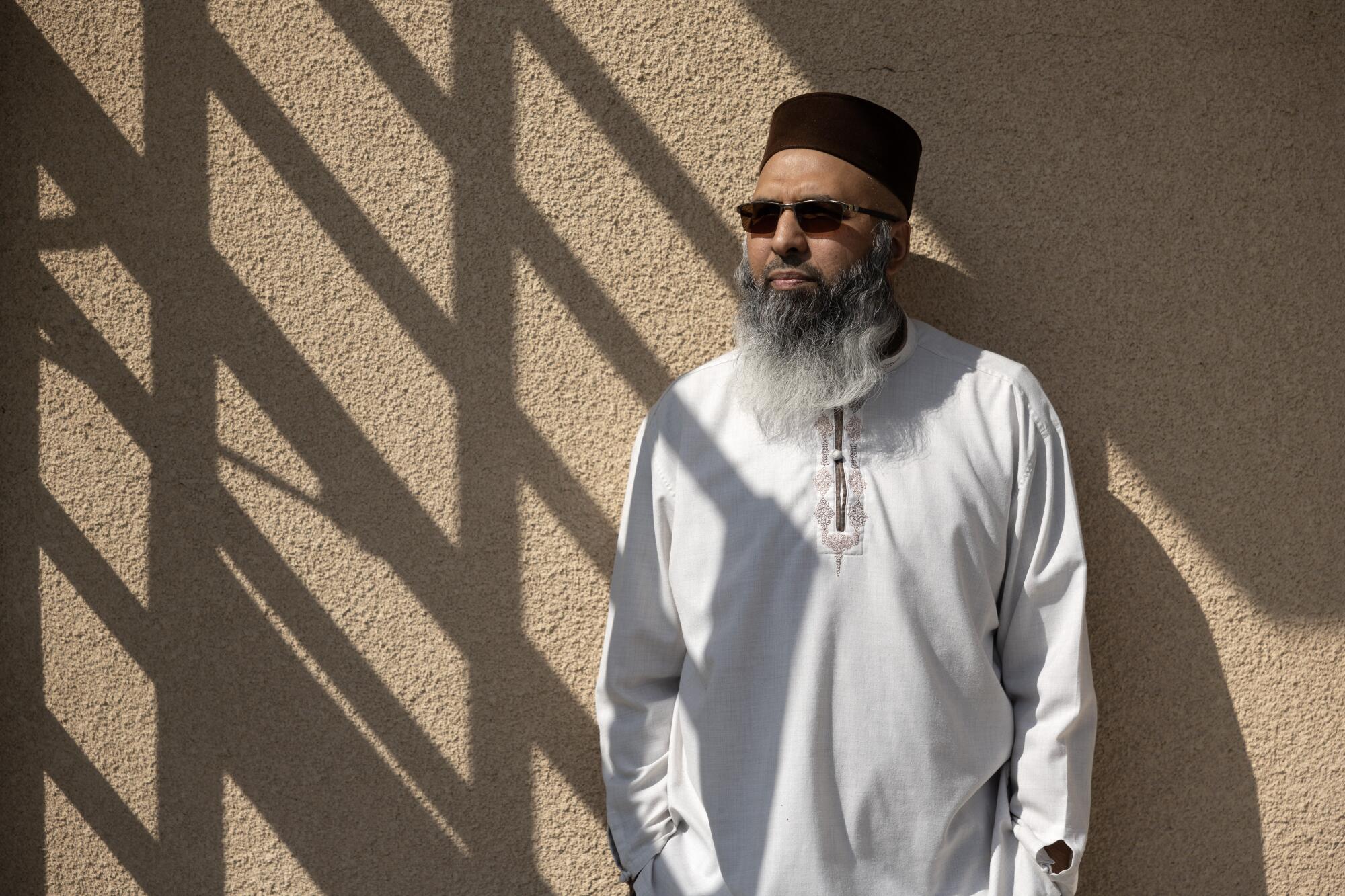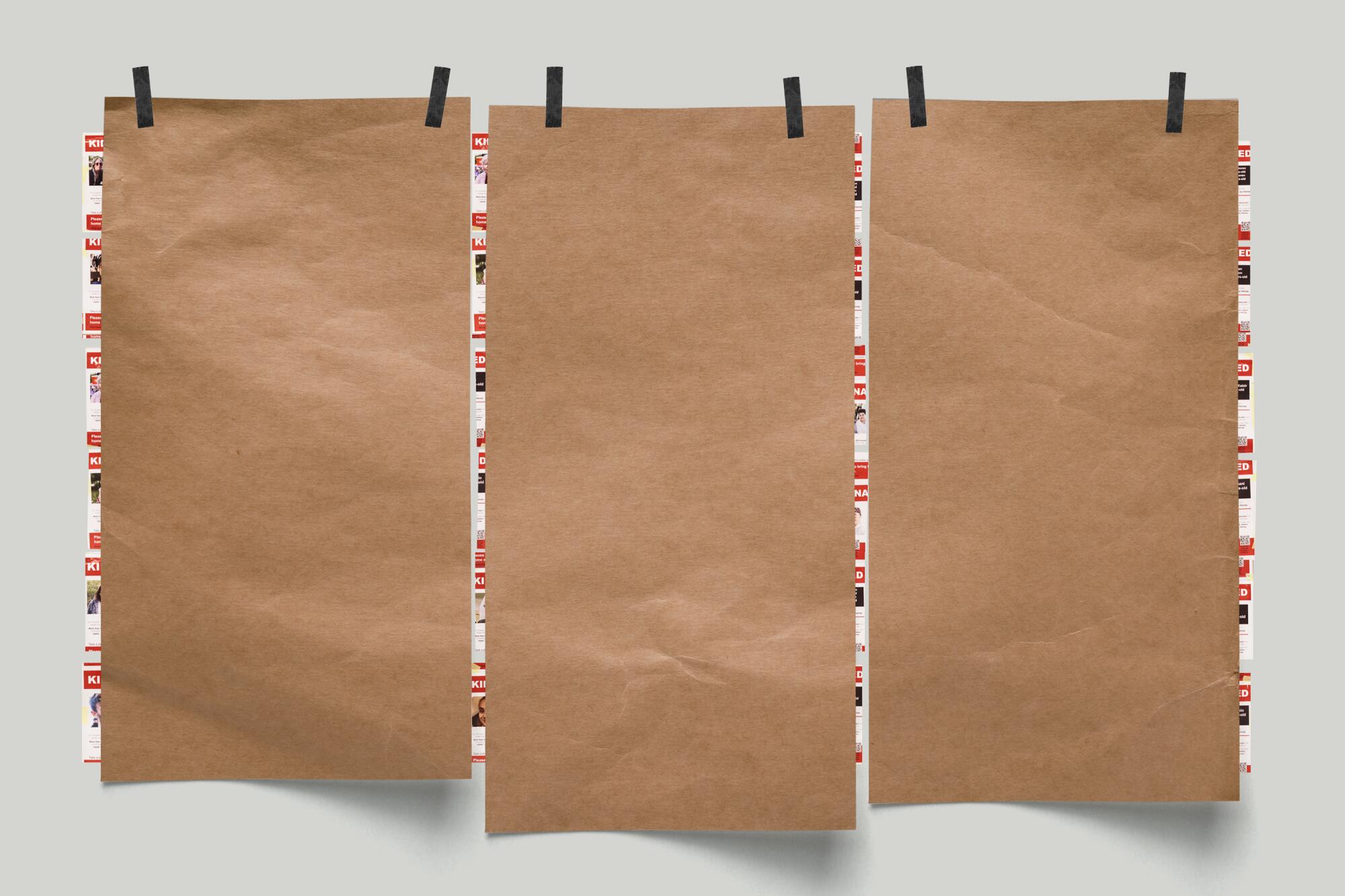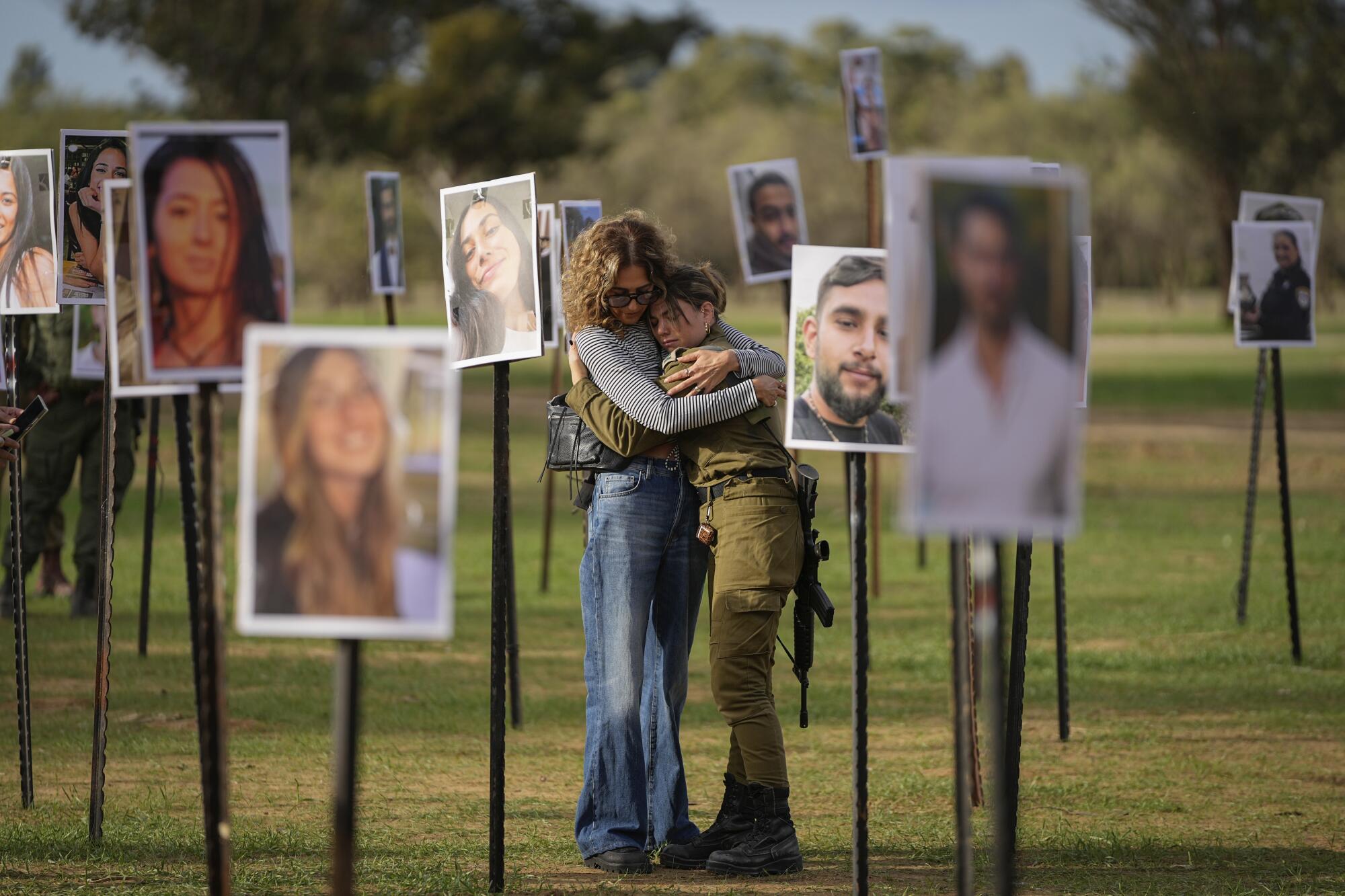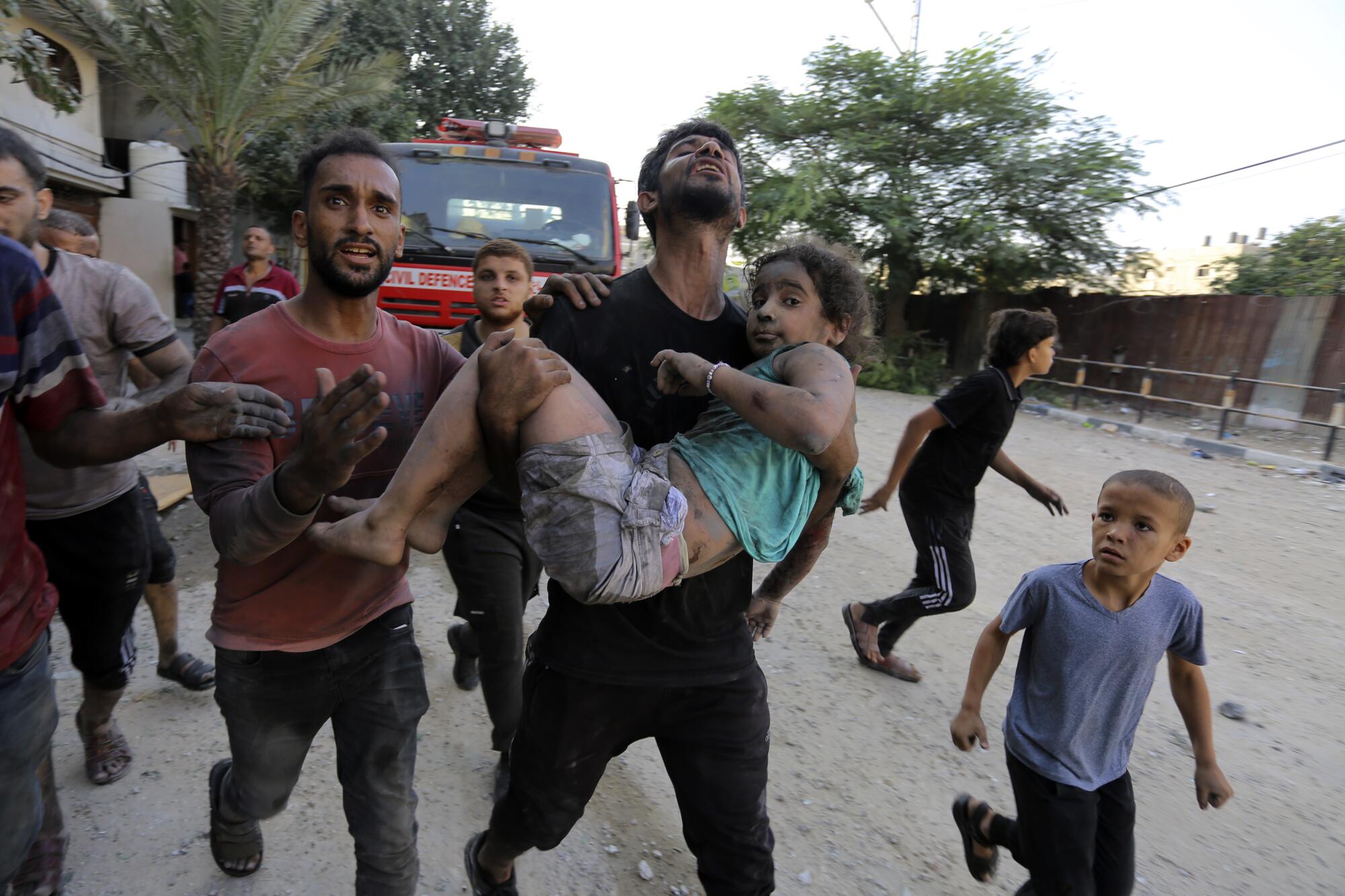
- Share via
It started with good intentions.
When a Jewish temple in the San Fernando Valley opened its doors to Muslims for the holy month of Ramadan, its rabbis hoped to offer a model of interfaith outreach.
“There is more that unites us than divides us,” Rabbis Stewart Vogel and Richard Camras wrote in an email to Hamakom L.A.’s congregation announcing their plan to rent their synagogue to the Islamic Society of West Valley, whose own house of worship was too small to accommodate everyone for the holiday.
The rabbis understood that their plan was unusual, particularly at a time when death and destruction in the Middle East weigh heavily on Muslim and Jewish communities around the world.
But they sought to transcend that. Their temple — formed last summer in the affluent neighborhood of Woodland Hills when two synagogues merged — would be a beacon of goodwill and understanding, a place where L.A. Jews and Muslims could gather in mutual toleration, appreciation and grace.
Hamakom is a strongly Zionist community that believes Israel has a right to self-defense and self-determination. Many in the congregation were shocked when they read the rabbis’ email.
Some worried about security. Others were bothered their evening programs and Friday Shabbat service would move to a different location. Most of all they wondered: Why were they notified the same day of the first Ramadan prayer service?
The dissent might have ended there. But just a few hours before Muslim worshipers started to arrive at the temple, a photo began to circulate.
It showed a display honoring Israelis taken hostage by Hamas in its Oct. 7. attack had been covered.
For many in the Hamakom congregation, the covering of Israeli hostages was a step too far. It represented an erasure of Israeli suffering and an unnecessary concession to political adversaries.
“It reminded me of World War II when Jews turned in Jews,” said Ronald Freeman, 69, a real estate investor and synagogue member for 40 years. “You want to use the word ‘traitor’ — I don’t know — or ‘collaborator.’ But that was so damn offensive to me.”
Even congregants who supported renting the space to an Islamic society said obscuring the hostage photos was a sacrilege.
“My heart was betrayed,” Vera Rubinstein, a member whose grandchildren attend the temple’s Hebrew school, posted on Facebook. “This was an absolute shonda!”
: :
The partnership between the synagogue and mosque was the product of years of interfaith work.
When Shaykh Suhail Mulla joined the Islamic Society of West Valley in 2017 as resident scholar, Vogel and the other rabbis at Temple Aliyah invited him to speak at a Shabbat service to honor the legacy of the Rev. Martin Luther King Jr.
Later that year, vandals painted antisemitic graffiti, including a swastika, on the guard shack at the entrance of the synagogue. Mulla, 51, a former social worker who leads a spiritual and psychological wellness center, delivered flowers.

Vogel, who trained in interfaith dialogue between Christians and Jews in the 1980s, reciprocated by attending a communal iftar meal to break the fast of Ramadan.
Dialogue is important, Vogel said, “because it challenges us to look beyond our assumptions, learn from one another and work together towards a more inclusive and harmonious society.”
Over the years, Mulla and Vogel swapped notes over coffee and lunch about spiritual leadership and how to connect with congregants.
Subscribers get early access to this story
We’re offering L.A. Times subscribers first access to our best journalism. Thank you for your support.
One of Mulla’s biggest challenges was that the west San Fernando Valley’s Muslim community was growing so fast that his congregants could no longer squeeze into his small mosque for Ramadan.
So when Temple Aliyah merged with Shomrei Torah last summer, the Islamic Society began negotiating with Hamakom’s real estate board to buy the old Temple Aliyah later this year when Hamakom moved into a renovated home at Shomrei Torah.
The goodwill continued even after Oct. 7, when Hamas killed 1,200 Israelis and seized about 250 hostages.
Hamakom erected the tribute to hostages in a hallway and sent care packages to Israeli soldiers. In January, Rabbi Camras led a “solidarity mission” trip to Israel to witness the destruction at Kibbutz Kfar Aza and the Nova music festival.

Four miles east in Canoga Park, the Islamic Society held nightly prayers for Palestinians as Israel bombarded the Gaza Strip. As the death toll climbed to 32,000 people and Gaza residents were trapped without food and basic supplies, the society also encouraged members to raise funds for Palestinian relief.
Through it all, the rabbis and imam maintain faith in the ties that bound Judaism and Islam together: a common origin in the Middle East through Abraham; a tradition of strict monotheism emphasizing the oneness of God; a reverence for biblical and Quranic shared prophets from Isaac to Moses.
“We have tried to build the understanding that we are relatives to one another,” Camras said.
Mulla agreed: “If two communities are going to band together, what better two communities than these?”
: :
The rabbis and the imam did not broach the issue of the Israeli hostage photos until two days before Ramadan.
When Mulla came to Hamakom on March 8 to shoot a video with Vogel and Camras to promote their interfaith partnership, Vogel suggested they cover the photos.
It was a short conversation.
“It was brought up in the context of, ‘We both want to feel comfortable in this space. We don’t want anything to offend you,’” Mulla said. “‘We will cover those up. We don’t want anybody in your community to be triggered.’”
In a gesture of sensitivity to the temple’s Muslim guests, Mulla said, Vogel also offered to cover up Hebrew scrolls in the lobby. But Mulla declined because he felt covering the scrolls would be sacrilegious.
Mulla did agree to covering up the hostage photos, believing it was a political rather than theological display. But he stressed he did not ask for it to be taken down.
“Our people would have come into the space and respected the space, regardless,” Mulla said. “They know they’re coming into another community space.”

On Friday night, Vogel said, he realized he had “extended the offer without thorough consideration” and made a “mistake in judgment.” But it was Shabbat, the Jewish day of rest.
The next day, Vogel and Camras agreed the hostages were an emotional issue and covering the photos was not in the best interest of their community. They reversed the decision.
But no one informed the custodial crew that had gotten instructions to cover the photos.
::
When Mulla arrived at Hamakom’s bright white synagogue on March 10, half an hour before the first Ramadan prayer service began, he was overjoyed to welcome his community to such a comfortable new space — one he hoped would be their eventual home.
But Mulla immediately realized there was a problem.
Next to the covered photos in the lobby, he said, he spotted Hamakom’s executive director, Aliza Goland, in tears.
“Is everything OK?” Mulla asked as he sat next to her. “What’s wrong?”
Mulla said Goland told him she had been bombarded with emails from synagogue members.
“There’s just been so much hate from our community,” Mulla said Goland told him.
Goland declined to confirm or deny this. In an email to The Times, she said that Hamakom’s leadership team “received comments from the congregation through email” and that the situation “upset many.”
Scores of Muslim families were already spilling into the temple. Soon hundreds of worshipers were kneeling in lines facing Mecca for the Isha prayer.
Among those in attendance was Hussam Ayloush, executive director of the Council on American-Islamic Relations office in Los Angeles and a contentious figure in some Jewish circles for his public statements since Oct. 7. He has generated headlines for saying, “Israel does not have the right to defend itself” and “For 75 years, every single day for the Palestinian people had been Oct. 7.”
Sign up for This Evening's Big Stories
Catch up on the day with the 7 biggest L.A. Times stories in your inbox every weekday evening.
You may occasionally receive promotional content from the Los Angeles Times.
Stepping on to a mini-stage inside the temple, Ayloush called on the congregation to build interfaith bridges and urged worshipers to be thankful for the privileges they enjoyed when many people around the world, including in Gaza, had lost the ability to break fast.
“We’re fasting by choice and will break our fast by choice,” Ayloush said. “The people of Gaza don’t have the means, don’t have access to food and drink.”
About half an hour later, in the middle of Tarawih prayers, one of the Islamic Society’s administrators told Mulla he’d gotten a text from Hamakom’s board chairman. He wanted to meet.
“The community’s unhappy,” the administrator said.
Mulla stepped up to the stage to deliver a message of unity, telling the congregation that “Hamakom” — the name of the Jewish temple they gathered in — meant “the place” in Hebrew and that Muslims have the same terminology in the Quran: Maqam Ibrahim, the place of Abraham.
After the service, Mulla resumed his conversation with the administrator, who had received more information and looked broken down.
“How bad is it?” Mulla asked.
Some of Hamakom’s members had threatened to revoke their membership and financial support, the administrator told him. The synagogue was terminating its rental agreement with the Islamic Society.
: :
Hamakom’s leaders were stunned to discover Ayloush had spoken at their temple.
His presence, coupled with the covering of the hostage photos, upset Hamakom members who lost family members or friends on Oct. 7 and had deep connections with families of the hostages.
“Someone with a history of that kind of rhetoric ... ,” Vogel said. “We would not have had him speak.”
Mulla, in turn, was surprised the rabbis opposed the presence of Ayloush.
The Islamic Society invited Ayloush, a well-respected figure in the Muslim community, to build enthusiasm and quell any hesitation about gathering in a Jewish synagogue, he said. Ayloush’s views about Israel and its invasion of Gaza, he added, aligned with most U.S. Muslim leaders — including himself.
“The vast majority of Muslim leadership in America does not agree with taking of innocent life in the massive way that they have, engaging in genocide and apartheid policies in violation of U.N. injunctions,” Mulla said.
: :
Hamakom uncovered the Israeli hostage photos not long after the Ramadan service ended. Then leaders went into damage control mode.
Two days after announcing the interfaith partnership, Hamakom’s senior leaders told their congregation that their decision-making and communication were “significantly flawed” and apologized for covering the hostage photos.
“This mistake was ours, and for it, we are deeply sorry,” they said in an email.
In town hall meetings and a statement to the community, Hamakom’s leaders announced two co-presidents had resigned. Going forward, they pledged to solicit community input and make sure their actions aligned with members’ values.
After the town halls, Rubinstein, the synagogue member, posted on social media that she was disheartened and worried about the safety of her grandchildren. The lack of transparency with the community, she said, “made me sick in my bones.”
Still, Rubinstein felt empathy for the rabbis and applauded their openness.
“It takes time to heal, time to trust again ... ,” she wrote in response to a Hamakom post on Facebook. “I have time.”
The post was later deleted.
Several Hamakom congregants asked to speak to The Times anonymously because they had personal connections with synagogue leaders or feared retaliation from outsiders.
One long-standing member said, “You don’t rent to your enemy in the middle of a war without consulting your congregation.”
Another member said he was OK with renting the space to the Islamic Society, but found the covering of the hostage photos immoral, a sign that “extreme progressive” rabbis were out of step with moderate and conservative members.
“I don’t think anything was done out of malice,” he said. “I just think there are blinders.”
: :
The evening after their first prayer service at the synagogue, Muslim worshipers packed into their tiny mosque.
Yusuf Khan, a 54-year-old data engineer who is a member of the Islamic Society, said he, like everyone, was disappointed the community had lost its dream of the temple as a new home. But as the days passed, he worried more about how the unraveling of the partnership could harm efforts to build stronger interfaith relationships.
The controversy, Khan said, weighed particularly on children.
After the lease was canceled, a middle school kid told him: “Hey, I guess the Jews really hate us.”
“We had to correct them: ‘No, we’ve had really good relations. We’ve been trying to bridge whatever misconceptions,’” Khan said. “You can go on and on try to explain that to a young person. But, you know, that’s not realistic, right?”

Mulla was anguished. The morning after the prayer service at Hamakom, Vogel had called Mulla to confirm the rental agreement was over and apologize.
Mulla saw Vogel as a gentleman and a good man. But he couldn’t help feeling the rabbis had caved to bigoted members of their congregation.
When an Islamic Society board member returned to the temple to collect equipment, Mulla said, he was escorted by an armed security guard. That felt unnecessarily hostile, Mulla said.
“OK, there is hurt in that community,” Mulla said. “But then it just translated into hate pretty quickly.”
Mulla believed the rabbis overestimated their congregation and had not realized anti-Muslim bigotry was in their ranks. But once they did realize, he said, they shied away from their duties as spiritual leaders.
“Part of the function and responsibility of religious leadership is guiding congregations and individual members towards what is good for them,” Mulla said. “What is good for them is to renounce hate and strive for love.”
On the 15th day of Ramadan, the Islamic Society’s board of directors put out a statement that Hamakom terminated their agreement in response to a section of its community driven by “baseless fear and prejudice against Muslims.”
The Islamic Society community was traumatized by a “proliferation of reactionary and vitriolic messages online,” they wrote, “originating from Hamakom community members (which have since been deleted).”
Mulla and the board chair could not provide screenshots of any messages after Hamakom deleted posts on Facebook and other social media sites.
Vogel felt disheartened as he read the Islamic Society’s statement. It was a reminder, he said, that fear, misunderstanding and prejudice can thwart attempts to build bridges.
“While the pain stemming from Oct. 7 is real and valid, it should never justify the expression of hate or prejudice.” Vogel said. “The transformation of hurt into hate, especially when it manifests as anti-Muslim sentiment, contradicts the core values of empathy, understanding and respect.”
But Vogel wouldn’t say whether he thought anyone in his community expressed hate or made anti-Muslim comments. “I cannot speak to any specific comments members of the congregation have made,” he said.
The rabbis ultimately agreed with Mulla that their job as spiritual leaders is to push around the edges and challenge members to live up to their shared spiritual values.
But the ordeal, they said, taught them that sometimes they have to be patient and allow healing to take place.
“Look, what we’ve realized is that when it comes to interfaith relations, there’s a time to push ahead, there’s a time to take a pause,” Vogel said. “And this comes to the post-Oct. 7 reality.”
After the canceling of the rental agreement, the Islamic Society invited Vogel and other Hamakom rabbis to join an interfaith iftar dinner Thursday at its mosque.
Vogel texted Mulla to tell him he would be traveling out of town and unable to attend. But he wished him good luck.
Mulla said the conflict had not dimmed his commitment to interfaith work — or his commitment to highlighting the plight of starving Palestinians. He planned to bring up the issue at the interfaith ceremony.
“Our nightly prayers are for Palestine and Palestinians, and those cut off from the most basic of human necessities,” Mulla said. “If that’s offensive to anyone, shame on them.”
More to Read
Sign up for This Evening's Big Stories
Catch up on the day with the 7 biggest L.A. Times stories in your inbox every weekday evening.
You may occasionally receive promotional content from the Los Angeles Times.














